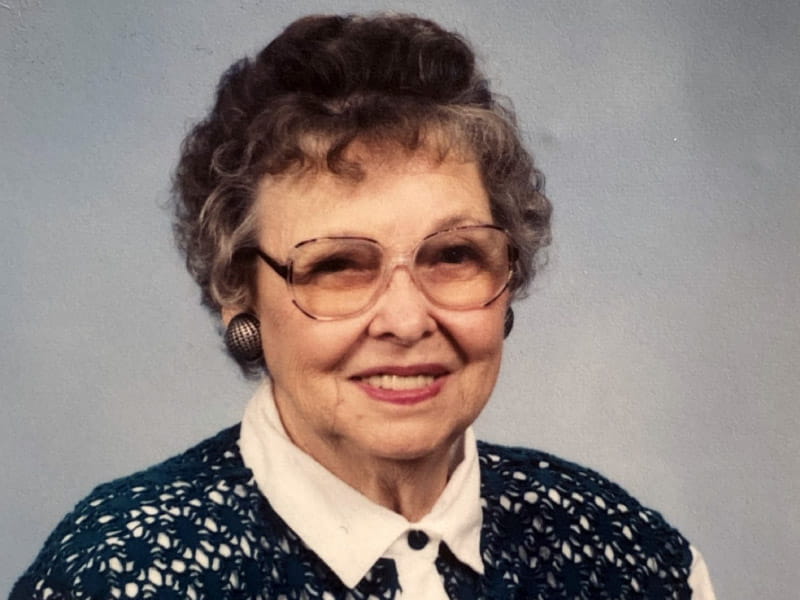This stroke survivor helped change the AHA

Ima Bunting walked into an American Heart Association office looking for answers.
It was 1974 and Bunting had had a stroke. In her 50s at the time, she pointed out to staff in the Austin, Texas office that survivors feel isolated and need more information on how to recover or prevent future strokes.
She asked the AHA to provide stroke education and to forge connections between survivors — and she wanted to help.
And help she did. Bunting was instrumental in forming the AHA's early Stroke Clubs where survivors met to support one another. She became coordinator for the Texas Affiliate Stroke Club and traveled around the state meeting with local chapters. Her work accelerated the AHA's momentum in stroke awareness, education and outreach, and it laid the foundation for today's American Stroke Association.
A fierce determination
Ima Belle Taylor Bunting was born in 1920 in Collinsville, Texas. She married at age 23 and received her bachelor's degree in education from Pan American University in Edinburg. She taught fifth and sixth grade in McAllen and Lubbock.
Bunting was 44 in 1964 when she checked in to the hospital for a planned hysterectomy. She carefully scheduled the surgery for July so she would be well enough to return in September to her teaching job. But Bunting never returned to work.
Her blood pressure dropped during surgery. Medical staff couldn't wake her. She had a stroke.
"My face drooped, I couldn't hold my head up and my whole left side was paralyzed," Bunting said in a July 1974 Fort-Worth Star-Telegram article.
When her hand fell off the bed, she had to wait for a nurse to move it back. Bunting started therapy within two weeks and learned to hold her head up again. In one exercise, according to the Star-Telegram, a therapist sprinkled powder on a table and Bunting had to figure out how to pull her left arm through it in a figure eight.
"I've always been so independent," Bunting said in the article. "I just figured that if I did my part, the good Lord would do his."
Bunting learned how to walk again but went home with a brace on her left ankle. Doctors said she might never walk long distances. She built up her strength by exercising and swimming three times a week, proving them wrong.
When she couldn't consistently hold her left foot on a stationary bike pedal, Bunting, determined and industrious, figured out she could if she wore high heels.
"That was just sheer determination," said Bunting's daughter, Diane Martin, who lives in Midland, Texas. "She limped real bad, but she could get around everywhere. She wasn't going to let life stop her. She was almost independent to a fault."
Martin recalls how, later in life, and despite the left side of her mother's body always feeling partially numb, she would set out in the RV she bought after her husband died. Bunting would be gone and out of touch for days or weeks at a time.
"She traveled everywhere in that RV," Martin said. "She would just take off."
Supporting stroke patients
The Stroke Clubs that Bunting helped organize were an adjunct of the AHA. Through the clubs people exchanged tips, worked out problems and learned new research about their health struggles. The clubs also sought to educate family members.
Martin says, "I remember Mom calling and saying she had a job." Martin was married and in her 20s at the time. "She was going to be a stroke coordinator. It turned into something she loved. It was very meaningful for her. She always liked helping people."
Part of Bunting's work was supporting stroke patients whose spouses left them after they had a stroke. One was a young mother whose husband left her after she had a stroke while giving birth. The woman, Bunting said, ended up making a full recovery after joining the club.
Bunting's trips to clubs around Texas included one to Forth Worth in 1974 for the first stroke club conference in conjunction with the annual meeting of the AHA, the Texas Affiliate. Bunting was one of three speakers.
El Paso had started a Stroke Club in 1973. Its 25 members met monthly and had socials and covered-dish suppers in summer. Club President Florence Vorhees had a massive stroke in 1971. Getting back into the mainstream was hard, she said in a February 1979 El Paso Times article. The club helps people to "try to encourage them every time they give up."
Bunting made her trips in between a busy schedule of organizing high school reunions, planning church group activities, supporting the Girl Scouts, traveling and participating in missionary trips, Martin said.
Since Bunting helped to launch the Stroke Clubs, the AHA revised its mission statement in 1985 to include stroke and added stroke to its slogan in 1993.
Bunting died in 2013 at age 93. But some 50 years after her visit to the AHA office, her legacy lives on: Since the founding of the American Stroke Association in 1998, fewer Americans are dying from stroke.
"She would be so happy," Martin said.





